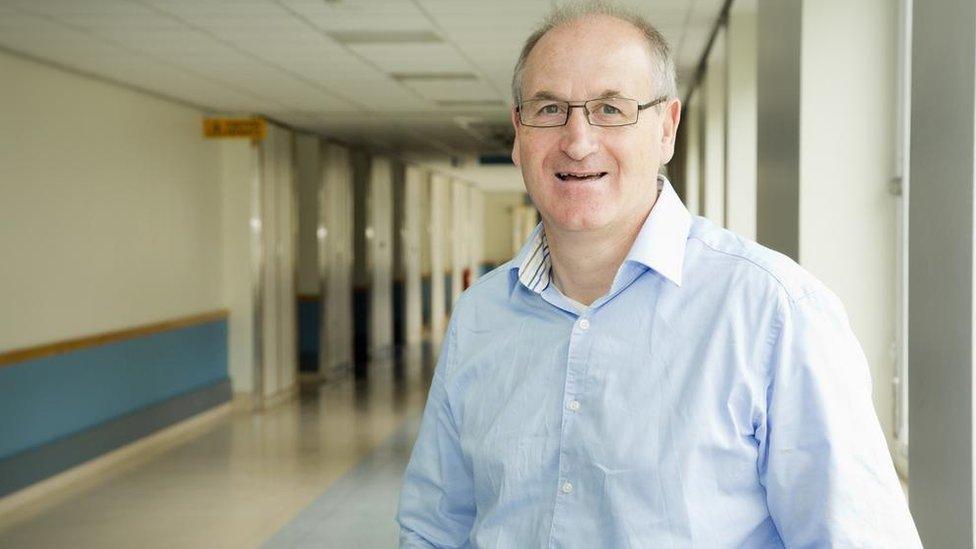Male pill: The scientist working on 'progress for humanity'
- Published

Prof. Barratt is working on contraception that prevents sperm cells from reaching an egg
A Welsh scientist working on a new male pill wants to reduce the burden on women of protecting against unwanted pregnancies.
Prof Chris Barratt is leading research on a non-hormonal drug which prevents sperm cells from reaching an egg.
His team at the University of Dundee has received significant funding from the Bill and Melina Gates Foundation.
"It's been a very poorly researched topic for 40 or 50 years," Prof Barratt said, but society has changed.
His team's research could see men given a gel or a pill that would affect the sperm cell, effectively disabling its function.
Instead of targeting the production of sperm, his research focuses on slowing the sperm cells' swimming action down and making them similar to those in infertile patients.
"The sperm cells are still produced in the same numbers so there's no effect on the man. It's just that those cells wouldn't be able to reach an egg and fertilise eggs," Prof Barratt said.

Prof Chris Barratt and his team have received funding from the Bill and Melinda Gates Foundation
The team received £3.45m ($4.4m) of funding in October from the Bill and Melinda Gates Foundation
Existing birth control pills prevent women's ovaries from releasing an egg and contain hormones which often produce side effects that can last months.
"It takes about three months to shut that factory down and it clearly doesn't work all the time, and there are some side effects.
"And then it takes three months to switch the system back on again," Prof Barratt said.
A non-hormonal pill could take just hours to disable the sperm, while hormonal birth control pills may take a few days to be effective and it would also be reversible within hours, he added.
Other groups are working on different types of approaches for male contraception but Dundee's approach is unique, Prof Barratt said, and could produce a non-hormonal contraceptive that works in both men and women.
Would men take it?
Keeping the side effects as low as possible is crucial to a wide take-up of the pill by men.
The compound his team is working on could also be given to women to block sperm in the female tract.
This would offer women a non-hormonal alternative form of birth control, meaning the side effects would be much reduced.
The Gates Foundation was keen to explore it in women too, Prof Barratt explained, and his team's approach has always been designed to cover both.

Prof Barrat's team at the University of Dundee's School of Medicine is working on non-hormonal contraception
Large pharmaceutical companies have historically shown very little interest in the area and "the safety bar is very high, so they've always been reluctant to get into the subject without somebody showing a bit of progress," Prof Barratt said.
The work is still in the discovery phase, but he hopes to be able to start clinical trials for safety in the next few years, followed by trials for efficacy in four to five years.
"The purpose of the Gates Foundation is largely to show progress," he explained.
Life ambition
Born and raised in Welshpool, a market town in Powys, Prof Barratt, who now leads the reproductive medicine department at the University of Dundee's School of Medicine, said he still feels "naturally Welsh".
"I lived in Wales until I was 22, the formative years in college and school. It's just part of me," he added.
He studied Zoology at Swansea University and obtained a PhD at the University of Birmingham.
Through the Gates foundation, his team is part of a global network collaborating with other groups working on different targets.
While it is collaborative, he said his team also needed to be competitive in its quest for progress.
"You're competing, but at the same time you're trying to get humanity over the fence. You can't let that stand in the way of progress for humanity," he said.
His life ambition remains, however, to see Wales comprehensively beat the All Blacks in rugby, live.
Related topics
- Published14 February 2023

- Published26 March 2019

- Published19 June 2019
